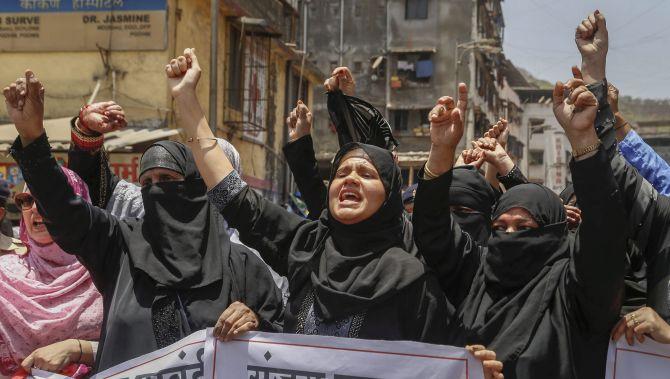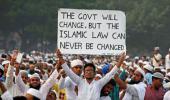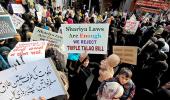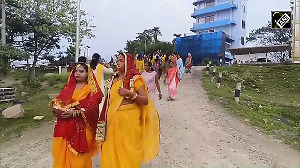'Who has seen what Sharia is? Who knows what actual Sharia is?'

Founder of the Bharatiya Muslim Mahila Andolan, social activist Zakia Soman has waged many a legal battle against the orthodox Muslim clergy seeking equality for Muslim women in social, economic and religious affairs.
Soman, who fought against the practice of triple talaq and is also a vocal proponent of the Uniform Civil Code discusses the Supreme Court verdict of July 10, 2024 delivered by the two-judge bench of Justices B V Nagarathna and Augustne George Masih that ruled that divorced Muslim women can seek maintenance from their husbands under Section 125 of the Criminal Procedure Code.
"So far, we have been told that we will not give you (legal justice) because Sharia doesn't require us to give (justice to) you (divorced women). They (the orthodox Muslims in India) have used the name of Sharia to deny Muslim women alimony rights. That is now being rendered immaterial," Soman tells Prasanna D Zore/Rediff.com.
How do you look at the Supreme Court's verdict on alimony to be given to divorced Muslim women?
It's a very welcome judgment; it's completely progressive. Ideally, there should not have been any need for the judgment because (Section) 125 of the CrPC (Criminal Procedure Code) applies to everybody, to all women.
Unfortunately, at the time of Shah Bano, this thing (the application of Section 125 of the CrPC applies to everybody, to all women) got reversed and that law was brought in 1986 specifically for Muslim women (In 1985 the Supreme Court, citing the provisions of Section 125 of the CrPC, ruled in favour of Shah Bano, a divorced Muslim woman, who had filed a suit against her husband Mohammed Ahmed Khan, for maintenance leading to a huge uproar among the Muslim men, who took out huge protests against this judgment and forced the then Rajiv Gandhi government to enact the Muslim Women (Protection of Rights on Divorce) Act 1986, which overturned the Supreme Court's 1985 verdict.
The Congress government headed by Rajiv Gandhi, which took over soon after the assassination of prime minister Indira Gandhi on October 31, 1984, had won a brute majority of 404 seats in a 514-member House and rode roughshod over the Opposition while passing the Muslim Women (Protection of Rights on Divorce) Act 1986).
Then (after this 1986 law was enacted) Muslim women were meant to claim alimony under that 1986 law. This judgment (granting the right to alimony to Muslim women under Section 125 of the CrPC) will open the doors for many more women to seek alimony after divorce.
Will this judgment take effect in retrospect? Will those women who have been divorced as per Sharia law before the Supreme Court's verdict on July 10, 2024, would also be eligible for seeking maintenance and alimony from their husbands?
It (the Supreme Court's July 10 verdict) says that maintenance is a right, not a charity, and it transcends boundaries of religion and whatever.
Time also? Will this new ruling take effect from the date of judgement or will it also be applicable in retrospect?
No, it's never retrospective normally. So it has to be now onwards (after July 10, 2024). Even otherwise, some women have been going and filing (for maintenance right) under (Section) 125.
The overall understanding is from now onwards, women will be able to go (seek maintenance rights) under this (Supreme Court verdict of July 10, 2024).
Do you see any political or social opposition to this ruling from the conservatives among the Muslim clerics in India?
Today, the (Muslim) conservatives are not so relevant. For all they want, they can keep opposing. But then, now not many people (among the common Muslims) listen to them.
Like earlier, when Shah Bano happened in 1985-1986, they (the conservatives among the Muslim clergy as well as the laity) were the ones who were dominant. But particularly in the last 20 years, you know, post the Internet world and post the knowledge and information technology (boom), people have stopped relying so much on the clerics.
What so changed between the enactment of the Muslim Women (Protection of Rights on Divorce) Act, 1986 and 2024 that Muslims in general -- not necessarily women, even men -- have stopped looking at the orthodox clergy...
... as the sole repositories of all matters of the Islamic faith?
Yes. What led to this change?
The awareness among Muslims in general that these people (the orthodox Muslim clerics and their followers among the Muslims) have not been useful to the community, that they have not done anything substantial.
They've only rigged up all the emotive issues plus the general awareness and general education about women's equality and rights of women has increased creating a sense of awakening among Muslims.
The women themselves have become very vocal and demanding about their rights.
Are Muslim women of the view that the Islamic clergy in India have been interpreting Islam and Sharia in a very orthodox way?
Yes. And that was abundantly proved at the time of abolition of triple talaq.
Their first response (of orthodox Muslim clerics in India) was to say that they opposed our petition saying that it was un-Islamic. That we are going against Islam.
We proved that it's very much they who are going against Islam because triple talaq has no mention in the Quran and nowhere in the other Muslim countries are divorces decreed thus.
We demonstrated that they are the ones who are against Islam, not the women (who were seeking the abolition of triple talaq).
Is there a general awakening among the Muslim women as well as men that the clergy is not interpreting the Sharia in a progressive way?
In the course of my work, the impression I get is many more people today are aware that the clergy is not competent, not committed to any reform or any change in society. That general consciousness is there.
What does Section 124 of the CrPC generally deal with and what is the importance of this section in the context of SC's judgment today?
It talks about maintenance post-divorce. It talks about maintenance irrespective of gender. In this two-bench judgement, Justice Nagarathna highlighted that she is not talking about any particular community or any particular religion.
She said that in general Indian men (irrespective of their religion) need to recognise the fact how much, if they are married, their wives sacrifice in building a life together.
Just because they are not able to go out of the home and work doesn't mean that they are not contributing to the well-being of the family. They are equally contributing by their unpaid care and work that they are doing not just for the husband, for the children, for the in laws, but for all family members.
So if the husband was to go out and work and if he was to hire professional help for all this, it would perhaps cost him half his salary, isn't it?
Let's not overlook the factor of commitment and love and affection with which the wife does all this, which any amount of professional help cannot replace. That seems to be the tone and tenor of Justice Nagarathna, and it's a very progressive, very gender friendly ruling.
Could you underline the importance of section 125 of the CrPC in the context of this judgment?
Under Section 125 of the CrPC, any and all divorced women are entitled to maintenance (after being divorced by their husbands). Normally, it (the alimony amount) is interpreted as per the economic and social status of the family of the husband. Not just the wife, even the children are entitled (for maintenance) under Section 125, even old parents are entitled.
It's (Section 125 deals with) like right to live with dignity for non-earning members of family. The earning member is sort of bound to provide them with maintenance.
Justice Nagarathna, while pronouncing the judgment, said that 'We are hereby dismissing the criminal appeal with the major conclusion that section 125 would be applicable to all women. Would all women also include women who are not married and are in a live-in relationship?
That includes women in live-in relationships (also). That also includes family members, such as daughters, such as a widower, widow aunts, a widow mother. It includes all people in your family who are part of the family, who are contributing to the family, but are not in a position to earn for themselves. So they too should be entitled to a dignified living, and that can happen only if they are given maintenance.
It's a very gender-just and progressive stance that Justice Nagarathna has taken, which is really amazing.
Why is this judgment being hailed as a landmark judgment? What are its far reaching consequences for Muslim women seeking alimony after divorce?
Since there are no codified Muslim family laws this judgment has opened the door for Muslim women to get legal justice in divorce and alimony matters.
Legal justice outside the purview of the Sharia?
Of course, because it (legal justice) has been so far denied. It has been denied in the name of Sharia.
Who has seen what Sharia is? Who knows what actual Sharia is? So far, we have been told that we will not give you (legal justice) because Sharia doesn't require us to give (justice to) you (divorced women).
They (the orthodox Muslims in India) have used the name of Sharia to deny Muslim women alimony rights. That is now being rendered immaterial. She can claim, she can go to court and claim (maintenance after divorce) under (Section) 125.
From today, a divorced Muslim women seeking alimony can go to any Indian court and seek alimony citing the Supreme Court's ruling of July 10, 2024?
Yes.












 © 2025
© 2025